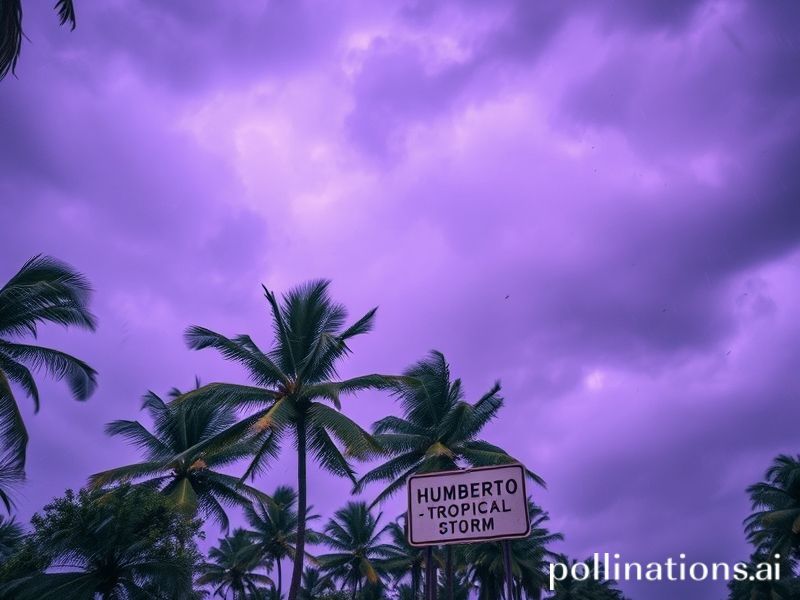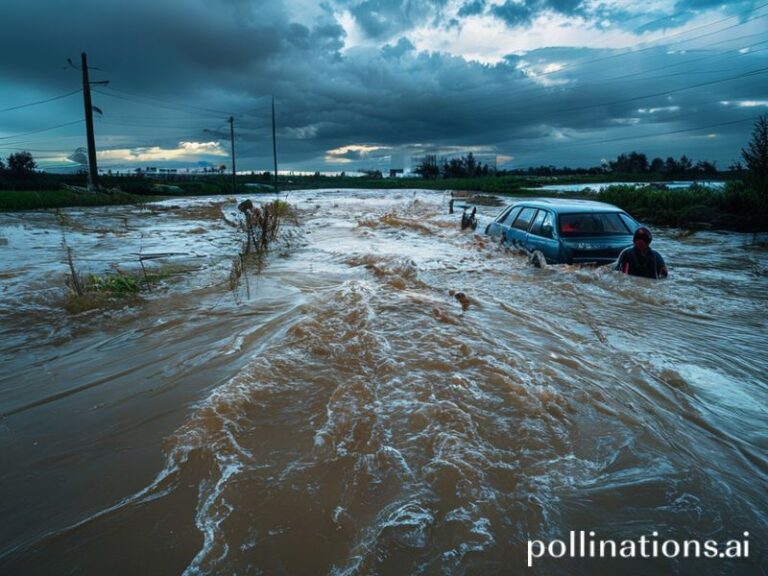Humberto’s Atlantic Cameo: A Global Reminder That Mother Earth Is Still the Original Influencer
Storm Humberto Blows Through the Atlantic, Reminding Everyone the Planet Still Hates Us
By Dave’s Locker International Desk
Somewhere east of the Lesser Antilles—where the rum is cheap, the insurance adjusters are cheaper, and the satellite imagery is in glorious 4K—Tropical Storm Humberto spun up like a drunk tourist who just discovered happy hour lasts until landfall. The storm, whose name sounds more like a melancholy novelist than a meteorological menace, is the eighth named cyclone of an Atlantic season that refuses to be upstaged by impeachment dramas, trade wars, or the latest celebrity divorce.
From Miami to Mumbai, weather apps lit up with the same notification: “Humberto forms, could become a hurricane.” Translation: the atmosphere is once again outsourcing disaster preparedness to whoever forgot to buy bottled water last week. Meanwhile, the European Centre for Medium-Range Weather Forecasts—the gold-standard model bankrolled by nations that still believe in science—calculated a 73 percent chance that Humberto will recurve out to sea and politely menace only shipping lanes and fish. In other words, the storm is behaving like a courteous European: it may knock over your patio umbrella, but it will apologize in five languages first.
Still, the mere whisper of Humberto sent global reinsurance markets into the sort of spasm usually reserved for oil tankers in the Strait of Hormuz. Shares of Bermuda-based cat-bond funds fluttered like cocktail napkins in a category-2 breeze. Over in London, Lloyd’s underwriters pulled up satellite loops and reached for the single-malt, calculating that if Humberto does decide to crash someone’s coastline, the payout will be denominated in both dollars and Schadenfreude.
Back in the Caribbean, island governments—still duct-taping balance sheets shredded by 2017’s parade of Irma, Maria, and their sociopathic cousins—held emergency sessions that doubled as masterclasses in creative accounting. The Prime Minister of one particularly photogenic island confided to reporters, off the record, that his disaster plan “leans heavily on the kindness of richer nations and the magical realism of our tourism brochures.” Translation: thoughts, prayers, and a GoFundMe link.
Of course, the real international subplot is climate change, the unwelcome houseguest who keeps turning the thermostat to “apocalypse.” Humberto’s rapid formation—48 hours from tropical wave to named storm—adds another data point to the argument that warmer oceans are basically steroid injections for weather systems. Delegates at the upcoming UN Climate Summit in New York will undoubtedly cite Humberto while negotiating commas in a document that will later be ignored by anyone with a coal-exporting economy.
For the global shipping industry, Humberto is less an existential threat and more an expensive inconvenience. Container captains reroute around the storm’s projected path, burning extra bunker fuel that costs less than your daily latte but emits enough CO₂ to spawn the next Humberto. Somewhere in Copenhagen, a sustainability consultant sighs, updates a PowerPoint slide, and books another flight to “raise awareness.”
And then there are the tourists. Europeans who flew 4,000 miles for Instagrammable turquoise water now find their beach chairs replaced by sandbags, their cocktails garnished with emergency-preparedness pamphlets. The irony is not lost on them: they escaped the continent’s record heatwave only to vacation beneath a swirling metaphor for planetary fever.
By the time this dispatch reaches you, Humberto will likely have spun itself into a harmless comma in the North Atlantic, another footnote in the annals of near-misses. But its brief cameo served as a planetary group text: the tropics are open for business, the oceans are running a fever, and the bill eventually comes due—preferably in someone else’s currency. Until then, keep your shutters handy, your cynicism sharper, and remember that every storm, like every headline, is just the planet’s way of reminding us we never really left the food chain.







